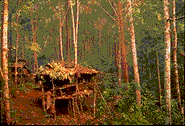

An enlargement of this photo showing Penan blockading a logging road. (55K, JPEG)
By October 1987, Penan, Kayan, and Kelabit communities had shut down roads at twenty-three different sites... For eight months, despite considerable hardship - hunger, heat exhaustion, and harassment by the logging interests - the indigenous peoples maintained their defiant, yet peaceful, blockades...
...In May, 1988, the blockades went up again, near Long Napir, bringing to a halt the logging operations of Minister of the Environment and Tourism, James Wong. Two more blockades sprang up in the Upper Baram in September, and four more in October... Between November 1988, and January, 1989, blockades occurred at seven sites...
...Then, on September 10, 1989, in a massive show of opposition, indigenous peoples in nineteen communities in the Upper Limbang and Baram, erected twelve new barricades. Five days later, the action spread south...
...On March 23, 1993, the Penan of the upper Baram initiated a third massive effort to halt the destruction of their ancestral homeland...
"All our huts were torn down with chainsaws and burned. When we were disabled by the tear gas, the police and soldiers went on to destroy our barricade, which we had been guarding for nine months. The police had shields and helmets, and they were hitting us without any pity. Some of us bled and fell unconscious. All of our pet monkeys, hens, and dogs were killed. One very sick child died later..."
Penan statement issued at Baa' Sebatu, October 22, 1993
"In jail there are five to a cell, five feet square. They give us food, place it on the floor in front of us, and walk in it. In our culture this is very rude. Many have been sick and ill. They would handcuff us, often one hand lashed to our ankles."
Unga Paren, headman, Long Bangan, November 2, 1990

"...you are where we keep our hearts, and we rely upon you. To wherever you return, to whatever country, until you reach your own house and your own family, until you reach your minister or your king, I hope that everything that I have said, that I have communicated today, will not be lost, and I want you to pass on everything I have said to your people there. I hope that it will not be lost.
"I am not speaking in jest, I am not inventing stories. I am speaking with great sincerity. I am not saying that things here are good, I am not saying that the situation here is happy. On the contrary, I am telling you all the problems. There is no happiness now.
" You yourself have seen the land that has been laid waste, the trees that have been destroyed, you have seen the sago that has been uprooted, you have seen the tajem trees and the fruit trees that have been felled."If your governments, or if you white people don't come and help us, surely it will be the end of life for us Penan. Our hardships are overwhelming us. I who say this, Wé Salau, my fate is to live only another two or three years, and perhaps I will die in the coming year. If I die, there is no one else who can speak as I have spoken. Perhaps what I know will die with me. Perhaps when you come again in a year or two you will meet only these children; perhaps only these children will remain.
"There is no other person as old as myself now. And there is no other old person who can tell you our story from former days up until the present. And we hope with hearts as big as this river, as big as that mountain, as big as the heavens, that you will be able to help us."
Wé Salau, the old headman, Baa' Bila, April, 1993
Wé Salau died in 1994

|
|
|
|
|
|
|
|